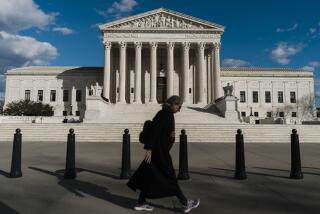Judge Bars Former Hostage From Testifying in Poindexter Case
- Share via
WASHINGTON — A federal judge refused to allow liberated hostage David P. Jacobsen to take the stand as a defense witness in the Iran-Contra trial of former National Security Adviser John M. Poindexter Monday for fear that the testimony would “inflame the jury.”
In a brief statement from the bench, U.S. District Judge Harold H. Greene said that the testimony of Jacobsen would be “completely irrelevant” to the case. The defense, the judge went on, wanted him to testify because it knew that the wrenching story of his 17 months of captivity in Lebanon would “inflame the jury and create a danger of unfair prejudice” to the prosecution’s case against Poindexter.
Jacobsen, who was released after the Ronald Reagan Administration secretly sold a shipment of missiles to Iran in 1986, conferred with Poindexter as the affair began to unravel in November, 1986, and reportedly told him not to say anything publicly that would endanger the rest of American hostages held by pro-Iranian Islamic fundamentalists in Lebanon.
Defense attorney Richard Beckler said this “was relevant to (Poindexter’s) state of mind in November” and would show that Poindexter was determined to be as careful as possible in his discussions with Congress because he knew that “any inaccuracy could have had a harmful effect on the safety of the hostages.” Poindexter is charged with involvement in a conspiracy to destroy documents and obstruct and lie to Congress.
But Greene dismissed the defense argument and agreed with a completely opposite interpretation by the prosecutors: Jacobsen’s testimony would probably sound to the jury like a justification for someone to withhold information from Congress in order to protect the hostages in Lebanon. But, since the defense contends Poindexter did not lie to Congress, the judge ruled, Jacobsen’s testimony could not be relevant.
Beckler showed his frustration on a day when Greene ruled against him more often than not on motions filed by the prosecution.
“It’s easier to get a member of the Politburo into this court than a member of Congress,” he shouted at one time as he complained that the House of Representatives had refused to let him interview 14 congressmen who had attended sessions in which Poindexter is accused of either lying or ordering his aide, Oliver L. North, to lie.
“This is just another attempt to stiff-arm us,” he went on.
Charles Tiefer, the House’s deputy general counsel, told Greene that he was in the process of asking the congressmen if they would be willing to speak with Beckler. The judge told Tiefer to contact the congressmen and try to persuade them to be interviewed so that it could be determined if they were needed as defense witnesses. But the judge also lectured Beckler, saying: “All I am trying to do is make decisions on issues of law and when you make speeches, it is not helpful.”
Greene also ruled that the defense could not subpoena Victor C. Johnson, a staff member of the House Foreign Affairs Committee, as a witness. In a June, 1986, memo proposing a congressional investigation into the affairs of North, Johnson said an inquiry would be “a good political issue.”
But the judge, accepting the prosecution’s contention that no one had a right to lie to Congress no matter what the motivation for its investigation, said “it is clearly not relevant that a congressman may have had a political motivation, even less so by a congressional staff member.”
More to Read
Sign up for Essential California
The most important California stories and recommendations in your inbox every morning.
You may occasionally receive promotional content from the Los Angeles Times.













